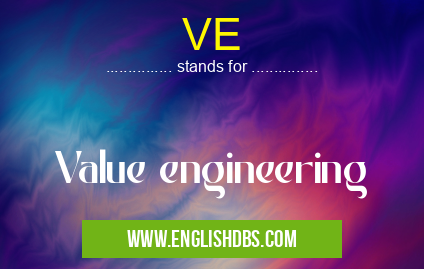What does VE mean in UNCLASSIFIED
VE (Value Engineering) is a systematic and organized approach to improving the value of products, processes, or systems. It involves identifying and eliminating unnecessary costs while maintaining or improving the functionality and performance of the target.

VE meaning in Unclassified in Miscellaneous
VE mostly used in an acronym Unclassified in Category Miscellaneous that means Value engineering
Shorthand: VE,
Full Form: Value engineering
For more information of "Value engineering", see the section below.
VE focuses on the relationship between function and cost, seeking to optimize both. By applying VE principles, organizations can reduce expenses, enhance efficiency, and deliver superior products or services.
Key Elements of Value Engineering
- Function Analysis: Identifying and defining the essential functions of a product or system.
- Cost Analysis: Determining the cost associated with each function and identifying areas for potential savings.
- Value Analysis: Comparing the value (functionality and cost) of alternative solutions and selecting the most cost-effective option.
- Creativity: Encouraging the generation and evaluation of innovative ideas to improve value.
- Teamwork: Involving a diverse team of experts to provide multiple perspectives and ensure objectivity.
Benefits of Value Engineering
- Reduces costs without compromising quality
- Improves product or system functionality
- Enhances efficiency and productivity
- Promotes innovation and creativity
- Increases customer satisfaction
Applications of Value Engineering
VE is applicable in various industries and sectors, including:
- Manufacturing
- Construction
- Engineering
- Healthcare
- Business processes
Essential Questions and Answers on Value engineering in "MISCELLANEOUS»UNFILED"
What is Value Engineering (VE)?
Value Engineering (VE) is a systematic process that optimizes the value of products, systems, or processes by identifying and eliminating unnecessary costs while preserving or enhancing functionality. It involves a team of experts who analyze and evaluate a project to identify areas where cost can be reduced without compromising performance, quality, or safety.
What are the benefits of Value Engineering?
Value Engineering can provide numerous benefits, including:
- Reduced costs
- Improved functionality
- Increased efficiency
- Enhanced customer satisfaction
- Competitive advantage
Who can benefit from Value Engineering?
Value Engineering can benefit a wide range of industries and projects, including:
- Manufacturing
- Construction
- Engineering
- Aerospace
- Healthcare
- Government
When is the best time to implement Value Engineering?
Value Engineering can be implemented at various stages of a project, but it is most effective during the early design phase. This allows for maximum cost savings and avoids costly rework later in the process.
How does Value Engineering work?
Value Engineering involves a systematic process that typically includes the following steps:
- Information gathering
- Function analysis
- Value analysis
- Alternative generation
- Evaluation
- Implementation
What is the role of the Value Engineering team?
The Value Engineering team is composed of experts from various disciplines, such as engineering, manufacturing, and finance. They work together to identify and eliminate unnecessary costs while preserving or enhancing the value of the project.
What are some common techniques used in Value Engineering?
Common techniques used in Value Engineering include:
- Function costing
- Brainstorming
- Pareto analysis
- Weighted factors analysis
Final Words: Value Engineering is a powerful tool that can revolutionize the way organizations approach cost optimization and value creation. By implementing VE principles, businesses can unlock significant savings, enhance product or service offerings, and gain a competitive advantage in the marketplace.
VE also stands for: |
|
| All stands for VE |
